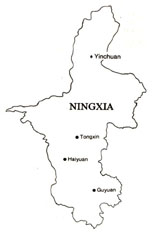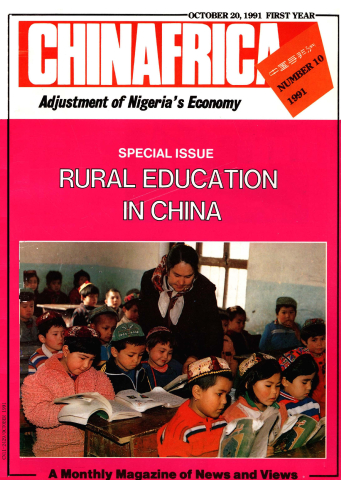Ningxia Hui Autonomous Region, located along the Yellow River in northwest China, is home to the Hui nationality. As part of the rural economic development plan, the local government has attached high importance to women education, a key obstacle to the universal education movement in Ningxia.
Since the founding of the People’s Republic of China in 1949, the Chinese government has put great emphasis on women education, and has made marked progress in the field. In some areas, however, the enrolment rate of girls is lower than that of boys. According to a sample survey conducted by the region’s educational department in 1987, the enrolment rate for girls in Hui areas was 8 percent lower than that of boys. A follow-up survey among 18 primary schools showed that only 40 percent of the girls finished the five-year programme. The reasons for girls not entering or dropping out of school are varied, including the traditional bias against girls, the customary duties of girls to look after younger brothers and sisters, or to take part in farming and household work. As a result, 70 percent of the illiterate people in Ningxia are women. The poor education of women not only affects their roles in socio-economic life, but also hampers the development of rural economy and culture.
To improve women education, the local government has taken a series of measures and achieved remarkable success. The enrolment rate of primary school-age girls of the whole region increased from 70.9 percent in 1981 to 88.1 percent in 1990. The number of girls now makes up 43.6 percent of the total number of pupils in primary schools.
The measures taken are:
1.Establish primary and secondary schools and classes for Hui girls.
Tongxin is one of the eight poorest counties in Ningxia, s southern mountainous areas, where Hui people make up 80 percent of the total population. Because of harsh natural environment and economic conditions, and because of prevailing old customs and ideas, the enrolment rate for Hui girls is low and the dropout rate high. The higher the grade, the fewer girls there are. In 1984, the proportions of Hui girls in the county’s schools were 27.1 percent for primary schools, 15.9 percent for junior high schools and 10 percent for senior high schools.
With the support of the local governments and the financial aid of local religious leaders, a Hui primary school for girls was set up in Weizhou Town in 1985. In 1986, Hong Weizong, a religious figure, donated 400,000 yuan for the establishment of the Hairu High School for Girls. Hui primary and high schools for girls provide convenient teaching and living facilities. These schools respect the customs of the Hui people. Slowly, dropout girls returned to school. In 1984, only ten Hui girls graduated from the primary schools in Weizhou Town and entered hign schools. After the establishment of the primary school for Hui girls, the rate of girls attending the higher grades greatly increased. Between 1987 and 1990, about 238 girls graduated from the town’s primary schools. Among them, 217 or 91.25 percent entered hgih schools. The enrolment rate of Hui girls in primary schools of Tongxin County increased from 40 percent in 1984 to 75.65 percent in 1990.
2.Strengthen the training of Hui women teachers.
In the mountainous areas of Ningxia, women teachers are in extreme shortage, creating a vicious cycle: few girl students —shortage of women teachers —even fewer girl students. In order to speed up the training of women teachers of the Hui nationality, the regional government in 1989 decided to set up a special one-year class in the Guyuan Normal College for Nationalities. The class enrolled senior high school graduates, with the number of girls no less than 70 percent of the total number of students. In the last two years, the national classes have enrolled 113 Hui girl students. The first 55 women teachers have now taken up teaching posts.
3.Take special policies and measures to encourage young girls to attend schools.
In order to encourage Hui girls to attend school and to promote the development of national education, Ningxia has worked out a series of special policies and measures adapted to local conditions. These policies and measures can be summarized as follows:
—The government propagates the Law on Compulsory Education and impresses on parents and society the importance and necessity of educating young girls.
—The People’s Congress of Ningxia has issued a law to prohibit the employment of teenage workers and protect the rights of young girls to go to school.
—In the mountainous areas where the Hui people live, girls can get free textbooks, and enjoy reduction or exemption of tuition fees; girls above the fourth grade of primary schools can get grants and scholarships.
—Seven boarding high schools and 77 boarding primary schools for the Hui were set up in seven counties. Every student in primary or high school enjoys a grant.
—Colleges and vocational high schools must enrol Hui girls who Have passed entrance exams. Girls who fail are sent to a preparatory course for supplementary study. When the government assigns working posts to graduates of colleges and vocational high schools, it emphasizes the equality of men and women. Discrimination against women is condemned.
—The Muslim Association in every county work out a pledge under which school-age children who have dropped out of schools are not to be admitted to chant scriptures as a profession. Some enlightened religious leaders encourage girls to enter schools with the admonition of Islamic doctrines—To learn is the natural duty of every Muslim man and woman and knowledge is the wealth of every person.
—Various kinds of schools for parents are held to enhance the awareness and culture of parents, especially mothers, in order to seek their support in sending their daughters to school.
4.Reform the teaching contents and offer courses for girls.
In order to instill in girls of the Hui nationality self-esteem, self-confidence, and self-reliance, all the high schools of Ningxia have started a new course—Theory and Knowledge of Nationalities—teaching students the history of the Hui nationality. This helps them to know the outstanding contributions made by their people for the unity and prosperity of China. Some schools hold lectures on specific topics, propagating the accomplishments made by the Hui people in history, introducing the Hui folklore, and teaching every student to cherish the unity of nationalities. In accordance with the requirements of local economic needs, the schools take vigorous action to reform the contents of courses. In some schools, lectures on puberty have been held. In vocational schools, technical courses, such as sewing, weaving, gardening, the proper use and maintenance of household electrical appliances, are taught.
In addition, Ningxia makes great efforts to eradicate illiteracy among women in rural areas.
Eliminating illiteracy has three aspects. The first is to avoid a new generation of illiterates. The second is to eliminate current illiteracy. The third is to raise the cultural level. This has been followed in various areas of the region. The elimination of illiteracy has been linked closely with the training of practical techniques. In 1990, about 4,051 technical training courses were held in the whole region. Some
147,000 women have received training in planting, breeding, or the processing industry.
In order to educate rural housewives, the government uses the method of assigning fixed persons to be responsible for eliminating illiteracy in a village or a household. A husband may teach his wife, a son may help his mother, and mother and daughter may study together. The rate of illiteracy in Yanchi County has dropped to 2.9 percent, and the women’s federation of this county has been appraised as an advanced women unit in eliminating illiteracy. The autonomous regional government summed up their experiences and introduced them to other places so that more and more women can play an active role in rural construction.



 Copy Reference
Copy Reference 